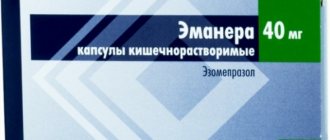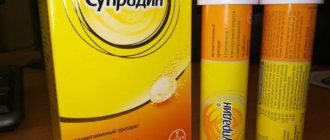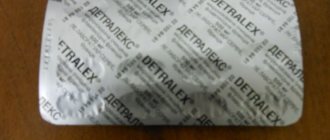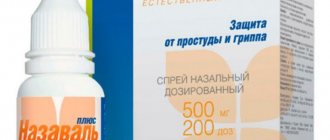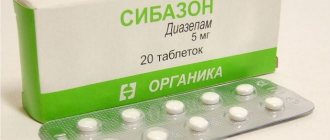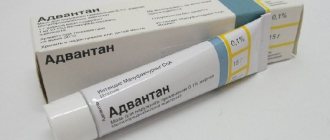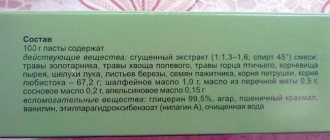Venarus today is one of the most popular venotonics among patients and doctors. Over the past five years, it has established itself as one of the most effective domestic drugs for the treatment of venous insufficiency. To increase compliance and therapeutic effect, an improved form of the drug was additionally developed, with a dosage of 1000 mg, of which 900 mg is the main active substance - diosmin.
Venarus contains two types of flavonoids - diosmin and hesperidin, which have an angioprotective effect, in addition, they improve microcirculation of the veins. The main indications include the presence of venous insufficiency, which manifests itself under the guise of the first stage of varicose veins. Venarus helps to increase the tone of vascular walls, eliminates venous congestion and capillary fragility, and improves local blood circulation.
Venarus also has an anti-inflammatory effect, reduces the severity of swelling, and eliminates pain in the legs. Diosmin and hesperdin have antioxidant properties, which have a beneficial effect on the condition of blood vessels and protect their walls from the aggressive effects of free radicals.
Description of the drug
The medical product "Venarus" is the only pharmacological drug that has proven therapeutic effectiveness in the treatment of hemorrhoids and venous insufficiency in the lower extremities. Impaired functioning of the venous valves is the main cause of such pathologies. The patient's blood flow becomes chaotic, pressure on the walls of the veins increases, which dilates the vessels.
Many patients who suffer from venous diseases are interested in what indications and contraindications “Venarus” has, whether it is suitable for everyone and whether it can cause side effects. In order to find out the answer to these and other questions, you need to study the instructions for this medicine.
Below is information about the contraindications of Venarus.
Composition, release form and packaging
This medication is available in the form of tablets coated with an orange-pink film coating, having a biconvex oblong shape with rounded edges and a score. On a cross section there is a core of brownish-gray or grayish-yellow color.
The drug "Venarus" contains the following active ingredients: hesperidin and diosmin.
Excipients that are used in the production of the medical drug "Venarus" are: microcrystalline cellulose, sodium starch glycolate (sodium carboxymethyl starch), gelatin, talc, magnesium stearate.
The tablet shell contains: hydroxypropyl methylcellulose (hypromellose), polyethylene glycol 6000 (macrogol 6000), sodium lauryl sulfate, titanium dioxide, magnesium stearate, red iron oxide, yellow iron oxide.
Contraindications for Venarus tablets are described in detail in the instructions.
Component Properties
The substance hesperidin is a plant flavonoid that is found in the peel of citrus fruits. It helps strengthen the walls of blood vessels and normalize their permeability, improve the condition of capillaries, increase blood flow in the coronary vessels, lower blood pressure and prevent the development of bleeding. In addition, hesperidin is able to relax the smooth muscles of blood vessels, as well as the bile ducts. It helps in the treatment of atherosclerosis, mycoses, various ulcers, allergic reactions and tumors. It helps to significantly reduce allergic and asthmatic symptoms, has anticarcinogenic, antioxidant and anti-inflammatory properties. In combination with diosmin, hesperidin has venotonic and angioprotective effects, reduces capillary permeability and the distensibility of veins, increasing their tone. The combined effect of these active components leads to a decrease in venous stagnation and normalization of the processes of lymphatic drainage and microcirculation.
Diosmin is a substance from the group of bioflavonoids. It has anti-inflammatory effects, improves lymphatic drainage (reduces lymphatic pressure, increases the frequency of contraction and tone of lymphatic capillaries, increases their functional density). In addition, diosmin reduces the migration of leukocytes into paravenous tissues and their adhesion to the walls of venous vessels, stabilizes microcirculation processes (reduces capillary permeability, increases their resistance). Diosmin has a phlebotonic effect (eliminates venous congestion, prevents excessive distensibility of vascular walls), increases oxygen diffusion and perfusion in skin tissues. This substance also helps to enhance the vasoconstrictor effect of adrenaline/norepinephrine, blocking the production of free radicals, the synthesis of prostaglandins and thromboxane.
pharmachologic effect
The medicine "Venarus" is a venoprotective and venotonic medication. It has a venotonic and angioprotective effect, reduces the distensibility of the walls of venous vessels, increases the tone of these vessels and reduces venous stagnation. In addition, the drug is used to reduce permeability, fragility of capillary vessels and increase their resistance. The drug improves lymphatic drainage and microcirculation. When used systematically, it helps to reduce the severity of clinical manifestations of venous insufficiency, which occurs chronically and has an organic and functional nature of origin.
Use during pregnancy and lactation
Contraindications for Venarus must be taken into account before prescribing.
In the process of conducting numerous experimental studies on animals, no teratogenic effects from the introduction of hesperidin and diosmin into the body were identified. So far, no side effects have been observed when using the medication by pregnant women. What else are contraindications for Venarus according to the instructions?
Due to the lack of information regarding the excretion of medicinal substances into breast milk, this medication is not recommended for women during breastfeeding.
Contraindications
Like any medicine, the drug "Venarusa" has a certain list of contraindications:
- individual intolerance to the components of the product;
- lactation period.
It is possible to use the medicine with caution at the time of pregnancy - strictly individually, after consultation with specialists.
Side effects are extremely rare when taking Venarus tablets. Sometimes observed - vegetative lability, as well as indigestion.
Dosing
The recommended dosage for acute hemorrhoids is 6 tablets per day: 3 pieces in the morning and evening for 4 days, then 4 tablets per day: 2 pieces in the morning and evening for the next three days.
For chronic hemorrhoids, the following dosage is recommended - 2 tablets per day with meals.
We have described the contraindications of Venarus; side effects will be given below.
Reviews about Venarus
Reviews from doctors about the tablets are positive. They are very often prescribed for varicose veins and circulatory disorders of the lower extremities. The drug is most effective in the early stages of the disease. Also, the medicine is often prescribed to prevent relapses in the postoperative period. Among the side effects, the most common are heartburn and other gastrointestinal tract disorders.
Reviews of Venarus for hemorrhoids are good. The drug quickly eliminates the unpleasant symptoms of the disease within a couple of days. It is popular among pregnant women and during the postpartum period.
Adverse reactions
The drug is generally well tolerated by patients, but may cause the following side effects:
- Nervous system: cephalalgia, dizziness, general malaise (rare), convulsions (frequency unknown).
- Digestive system: diarrhea, dyspeptic disorders, nausea, vomiting (often), colitis (uncommon), abdominal pain (frequency unknown).
- Respiratory system: chest pain, sore throat (frequency unknown).
- Skin: rashes on the body, itching, urticaria (often), allergic dermatitis, skin hyperemia, isolated swelling of the lips, face, eyelids (frequency unknown), angioedema (in rare cases).
If you take into account all the contraindications, the side effects of Venarus will not appear so strongly.
If any of the above undesirable reactions occur or the patient notices other undesirable reactions, you should immediately inform your doctor.
Special Recommendations
Not everyone thinks about the contraindications of Venarus. In case of exacerbation of hemorrhoids, the use of this medication does not replace specific therapy for other anal disorders. The duration of therapeutic measures using this drug should not exceed the time prescribed by the doctor. If the symptoms do not disappear after the recommended course of treatment, a proctological examination should be performed and the treatment tactics should be reconsidered.
In the presence of circulatory disorders in the venous vessels, the maximum results from the treatment are ensured by a combination of treatment with a balanced (healthy) lifestyle. It is advisable to avoid prolonged exposure to sunlight and standing on your feet for a long time. In addition, patients are shown to reduce excess body weight. Walking and wearing special compression stockings help normalize blood circulation.
The medical drug "Venarus" does not affect the ability to drive vehicles and operate dangerous machinery. There were no cases of overdose.
There are also no drug interactions between the drug and other medications, however, it is imperative to inform the treating specialist about all medications taken.
If there are contraindications to the use of Venarus, it can be replaced with an analogue.
When the drug is not recommended: contraindications
The drug is not prescribed to patients who have an individual intolerance to the active substances of the drug or to additional ones.
Venarus is not recommended for use during lactation, as well as in the first trimester of pregnancy.
May be of interest:
|
Analogs
In the list of analogues of venotonic "Venarus" the following medications can be noted:
- "Detralex" is a medicine that has an identical structural formula and contains hesperidin and diosmin. This drug reduces the distensibility of the venous membranes, tones the veins, increases the permeability of venules and capillary networks, eliminates venous congestion, activates the functioning of vascular valves, eliminates swelling and symptoms of recurrent hemorrhoids. In addition, this medication reduces the likelihood of blood clots forming in blood vessels. It can be prescribed during pregnancy and breastfeeding.
- "Antistax" is a drug based on dry grape leaves that has an angioprotective effect. It helps eliminate swelling in the legs and relieves fatigue. This is a natural remedy for treating veins and is even prescribed to pregnant patients.
- "Vasoket" is a medicine based on one component - diosmin. It is prescribed for the treatment of venous and lymphatic insufficiency, varicose veins in the legs, hemorrhoids, and disturbances in venous blood flow.
- "Troxevasin" is a vascular strengthening drug that reduces the permeability and fragility of capillaries, increasing the elasticity of the vascular membranes. The membranes of venules and capillaries thicken, diapedesis decreases. In addition, this remedy helps prevent the development of inflammation of the capillary and venous walls. The medication is prescribed for postphlebitic syndrome, venous insufficiency, trophic neoplasms on the legs, in the acute stage of hemorrhoids, and in the postoperative period after removal of varicose veins.
What comments are there about the drug “Venarus”, indications and contraindications for this drug?
Analogues of the drug "Venarus"
Analogs have a similar effect:
- "Venoruton".
- "Heparin."
- "Ginkum".
- "Detralex."
- "Venolife".
- "Girudoven."
- "Ginkor gel".
- "Phlebodia 600".
- "Mexiprim."
- "Anavenol".
- "Vazoket."
- "Venozol".
- "Sinkumar".
- "Troxevasin".
- "Antistax."
- "Askovertin."
- "Ascorutin".
- "Venolek."
The drug "Venarus" - cheaper analogues
Cheaper analogues of the drug are:
- "Antistax."
- "Venolek."
- "Vazoket."
- "Askovertin."
- "Ascorutin".
Reviews
Patients who have taken this medication speak positively about it. According to reviews, Venarus has few contraindications and side effects, it is well tolerated by the body, does not provoke nausea and stool disorders, which is often observed when taking other medications. As for the therapeutic result, patients observed a significant decrease in fatigue in the legs, swelling caused by impaired venous blood flow, and a decrease in the size of varicose nodes.
Despite the visible effect, reviews note that this medicine helps fight varicose veins only in the early stages of the development of this disease. If a person has a severe stage of the disease, then in this case only surgical intervention can help get rid of the problem.
We looked at the contraindications and side effects of Venarus.
Venarus and Detralex: what to choose?
Today, pharmaceutical companies produce a huge number of drugs prescribed for venous insufficiency, however, Venarus and Detralex are most often compared. Since phlebologists often prescribe these particular drugs, the question of which one is better arises involuntarily.
These drugs can be compared quite often, even considering that they have the same composition - combinations of two flavonoids. Like Venarus, Detralex contains diosmin and hesperidin, but in the same concentration. The cost of the drugs is approximately the same, although Detralex is slightly more expensive because it is produced by the private French laboratory Servier.
Now attention should be paid to the effectiveness of the drugs. Since the composition of the products is the same, it is natural that the effectiveness of the drugs will not differ. However, most patients prefer to buy Detralex, believing that the manufacturer uses higher quality active ingredients.
It was also noted that Detralex has the ability to be absorbed more quickly due to a different manufacturing method. However, both drugs have identical effectiveness and side effects.
In general, these are the same drugs, differing in the country of manufacture and price category. As a rule, Venarus is prescribed as an analogue of Detralex, as a budget drug, but at the same time, effective.
Read in detail about the use of Detralex
Venarus and Detralex: what to choose?

